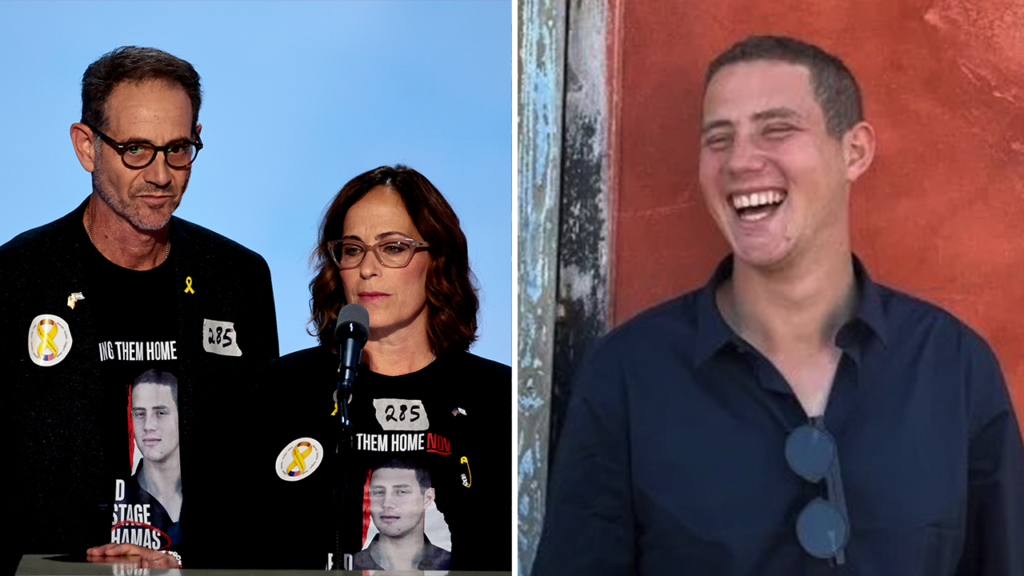Omer Neutra, a 22-year-old American, has been held hostage by Hamas for over 330 days, a plight that weighs heavily on his family and loved ones. His parents, Orna and Ronen Neutra, who reside in Long Island, have been vocal about the anguish they endure as they wait for their son’s return. In an interview with Fox News Digital, Orna described her son as someone who is genuinely friendly and attentive to others. “He sees people. He pays attention. He has this great sense of humor. So, he touches so many,” said Orna, capturing the essence of a young man known for his kindness. This sense of community and connection is at the heart of their distress, especially as Omer approaches his 23rd birthday next month.
Ronen Neutra added a glimpse into Omer’s personality, revealing his passion for basketball, specifically his love for the New York Knicks. “He knows all their stats, whether they win or lose. We hope that those numbers and the stats in his head are keeping him busy,” Ronen shared, highlighting the mental strategies the family employs to cope with the extended absence of their son. The emotional toll is compounded by the stark reality of their daily lives; the Neutras wear duct tape on their shirts to mark each day of Omer’s captivity, a poignant reminder of the time lost and the escalating threat to his safety.
Omer’s situation is part of a larger crisis that began on October 7, 2023, when Hamas launched a surprise attack, taking numerous individuals, including Israeli American Hersh Goldberg-Polin, as hostages. Tragically, following months of uncertainty, Hersh’s family confirmed his death, which has only deepened the Neutra family’s sense of urgency. Ronen expressed his devastation, stating, “They are practically our family now.” His words reflect a bond formed through shared suffering, especially as they grapple with the horror of knowing that Hersh survived harsh conditions only to be executed by his captors.
The increasing urgency surrounding the situation cannot be overstated. The Neutras, like many families waiting for their loved ones to return, understand that time is not on their side. Orna emphasized, “Their lives are at risk every single day.” The recognition that they are dealing with a terrorist organization adds to the complicated nature of their plight. Ronen articulated the grave challenge in negotiating with Hamas, stating that any attempt to broker a deal feels futile when the captors hold all the power, using their loved ones to dictate the terms of engagement.
Adding a historical layer to their narrative, the Neutras are dual American-Israeli citizens with roots tied to Holocaust survival. Ronen’s grandfather fought against the Nazis as a member of the Jewish Partisans, while Orna’s family also navigated the treacheries of World War II, ultimately using resilience and action to protect their kin. Orna reflected on these legacies of defiance and survival, expressing a fervent hope that Omer embodies similar qualities during his ongoing captivity.
Their advocacy extends beyond personal anguish; the Neutras recently addressed the Republican National Convention, seeking to raise awareness about the hostage crisis. Their appearance was met with an impassioned “bring them home” chant from the crowd, underscoring the support they are receiving. “We feel it,” Orna said, emphasizing the impact of public backing during this harrowing time.
The broader implications of Omer’s captivity resonate within contemporary discussions about antisemitism and the Israeli-Palestinian conflict. Since the attacks on October 7th, there has been a reported 700% increase in antisemitic incidents on college campuses, according to Hillel International. Ronen expressed concern over the lack of understanding among younger generations regarding the complex realities of the conflict, urging students to engage thoughtfully rather than with slogans that call for the obliteration of Israel.
Orna reinforced the call for compassion toward all individuals affected by the conflict, advocating for focus on hostage release as a priority. “If you are really concerned about loss of life…then you should be calling for the release of the hostages and for Hamas to surrender,” she asserted, pleading for empathy and understanding amidst rising tensions.
Despite their considerable fortitude, Orna and Ronen continue to communicate with the White House as they strive for their son’s release. Their daily question remains profound: “What are we doing today to advance our cause and getting closer to bringing home [Omer] and the rest of the hostages?” It is a haunting inquiry that mirrors both their hope and desperation as they navigate this excruciating odyssey, flanked by love and the relentless desire for justice.



